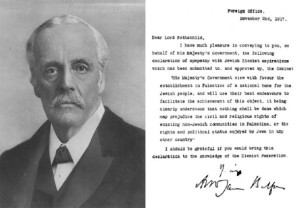 November 2 marked the 97th anniversary of the Balfour Declaration, a letter from British Foreign Secretary Arthur Balfour to Lord Rothschild, a member of the British House of Lords, an early Zionist leader, and one of the world’s richest men. The declaration came in the midst of World War I, when Palestine was still nominally under the rule of the Ottoman Empire. Its importance was in signaling that the world’s largest empire was lending its support to the then still-relatively weak Zionist settler movement in its quest to establish a state in Palestine.
November 2 marked the 97th anniversary of the Balfour Declaration, a letter from British Foreign Secretary Arthur Balfour to Lord Rothschild, a member of the British House of Lords, an early Zionist leader, and one of the world’s richest men. The declaration came in the midst of World War I, when Palestine was still nominally under the rule of the Ottoman Empire. Its importance was in signaling that the world’s largest empire was lending its support to the then still-relatively weak Zionist settler movement in its quest to establish a state in Palestine.
The following is an excerpt from the book, “Palestine, Israel and the U.S. Empire,” published by PSL Publications:
The infamous Balfour Declaration of Nov. 2, 1917 read:
Dear Lord Rothschild:
I have much pleasure in conveying to you, on behalf of His Majesty’s Government, the following declaration of sympathy with Jewish Zionist aspirations which has been submitted to, and approved by, the Cabinet:
“His Majesty’s Government view with favour the establishment in Palestine of a national home for the Jewish people, and will use their best endeavours to facilitate the achievement of this object, it being clearly understood that nothing shall be done which may prejudice the civil and religious rights of existing non-Jewish communities in Palestine, or the rights and political status enjoyed by Jews in any other country.”
I should be grateful if you would bring this declaration to the knowledge of the Zionist Federation.
Yours sincerely
Arthur James Balfour
Underlining the colonialist character of the note is the phrase: “nothing shall be done which may prejudice the civil and religious rights of existing non-Jewish communities in Palestine.” The “existing non-Jewish communities”—the Palestinian Arabs—went unnamed, despite comprising 92 percent of the population at the time. While national rights were emphasized for the tiny settler minority, no mention was made of the same rights for the indigenous majority.
As Palestinian scholar Dr. Ismail Zayid wrote about the Balfour Declaration:
It is interesting to note that the four-letter word “Arab” occurs not once in this document. … To refer to the Arabs who constituted 92 percent of the population of Palestine and owned 89 percent of its land, as the non-Jewish communities, is not merely preposterous but deliberately fraudulent. … Palestine did not belong to Balfour to assume such acts of generosity.
The Balfour Declaration sparked great outrage, particularly among the rapidly growing urban populations, the centers of political activity in the region. The Balfour Declaration and the Sykes-Picot Agreement [which divided most of the Middle East between the British & French empires] were widely viewed by the Arab masses as a double betrayal by Britain. Instead of liberation, Arabs from Jerusalem to Damascus to Baghdad found themselves as colonial subjects under the domination of the world’s two largest empires. What made the new colonialism even worse was that their land had been designated by the imperial rulers as a “national home” for another people.
Read the whole book; visit PalestineBook.com
That even Balfour’s pledge not to “prejudice the civil or religious rights of the existing non-Jewish communities in Palestine,” was nothing but empty words was revealed in a memo he wrote n 1919:
“In Palestine we do not propose even to go through the form of consulting the wishes of the present inhabitants of the country . . .The Four Great Powers are committed to Zionism. And Zionism, be it right or wrong, good or bad, is rooted in age-long traditions, in present needs, in future hopes, of far profounder import than the desires and prejudices of the 700,000 Arabs who now inhabit that ancient land”
The Balfour Declaration along with the Sykes-Picot accord remain vivid memories for the people of the Middle East because of the crucial role they played in the struggle that continues to this day.






